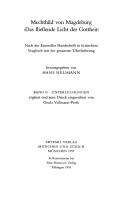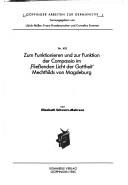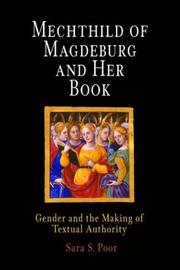| Listing 1 - 4 of 4 |
Sort by
|
Book
Year: 1926 Publisher: München: Ernst Reinhardt,
Abstract | Keywords | Export | Availability | Bookmark
 Loading...
Loading...Choose an application
- Reference Manager
- EndNote
- RefWorks (Direct export to RefWorks)
Mysticism --- Mechthild, - of Magdeburg, - ca. 1212-ca. 1282

ISBN: 3484891017 3760834000 3484891009 9783484891012 9783760834009 Year: 1990 Volume: 100-101 Publisher: Tübingen Max Niemeyer Verlag
Abstract | Keywords | Export | Availability | Bookmark
 Loading...
Loading...Choose an application
- Reference Manager
- EndNote
- RefWorks (Direct export to RefWorks)

ISBN: 387452633X 9783874526333 Year: 1985 Volume: 410 Publisher: Göppingen Kümmerle
Abstract | Keywords | Export | Availability | Bookmark
 Loading...
Loading...Choose an application
- Reference Manager
- EndNote
- RefWorks (Direct export to RefWorks)
Non-fiction --- German literature --- Matilda of Magdeburg --- Suffering --- Mysticism --- Religious aspects --- Christianity --- History --- Early works to 1800. --- Mechthild, --- Suffering - Religious aspects - Christianity - History - Middle Ages, 600-1500. --- Mysticism - Early works to 1800. --- Mechthild, - of Magdeburg, - ca. 1212-ca. 1282. - Fliessende Licht der Gottheit.

ISBN: 0812238028 1322511101 0812203283 9780812238020 Year: 2004 Publisher: Philadelphia : University of Pennsylvania Press,
Abstract | Keywords | Export | Availability | Bookmark
 Loading...
Loading...Choose an application
- Reference Manager
- EndNote
- RefWorks (Direct export to RefWorks)
Sometime around 1230, a young woman left her family and traveled to the German city of Magdeburg to devote herself to worship and religious contemplation. Rather than living in a community of holy women, she chose isolation, claiming that this life would bring her closer to God. Even in her lifetime, Mechthild of Magdeburg gained some renown for her extraordinary book of mystical revelations, The Flowing Light of the Godhead, the first such work in the German vernacular. Yet her writings dropped into obscurity after her death, many assume because of her gender.In Mechthild of Magdeburg and Her Book, Sara S. Poor seeks to explain this fate by considering Mechthild's own view of female authorship, the significance of her choice to write in the vernacular, and the continued, if submerged, presence of her writings in a variety of contexts from the thirteenth through the nineteenth century. Rather than explaining Mechthild's absence from literary canons, Poor's close examination of medieval and early modern religious literature and of contemporary scholarly writing reveals her subject's shifting importance in a number of differently defined traditions, high and low, Latin and vernacular, male- and female-centered. While gender is often a significant factor in this history, Poor demonstrates that it is rarely the only one. Her book thus corrects late twentieth-century arguments about women writers and canon reform that often rest on inadequate notions of exclusion. Mechthild of Magdeburg and Her Book offers new insights into medieval vernacular mysticism, late medieval women's roles in the production of culture, and the construction of modern literary traditions.
Matilda of Magdeburg --- Mechthild, --- 091 MECHTILDIS MAGDEBURGENSIS DE HELFTA --- Handschriftenkunde. Handschriftencatalogi--MECHTILDIS MAGDEBURGENSIS DE HELFTA --- 091 MECHTILDIS MAGDEBURGENSIS DE HELFTA Handschriftenkunde. Handschriftencatalogi--MECHTILDIS MAGDEBURGENSIS DE HELFTA --- 091-055.2 --- 091-055.2 Handschriftenkunde. Handschriftencatalogi--Vrouwen --- Handschriftenkunde. Handschriftencatalogi--Vrouwen --- German literature --- Manuscripts. Epigraphy. Paleography --- anno 500-1499 --- anno 1200-1299 --- anno 1300-1399 --- Germany --- Women mystics --- Cultural Studies. --- Gender Studies. --- Literature. --- Medieval and Renaissance Studies. --- Women's Studies. --- LITERARY CRITICISM / Medieval. --- Mystics --- Mechtildis Magdeburgensis de Helfta --- Mechthild, - of Magdeburg, - ca. 1212-ca. 1282. - Fliessende Licht der Gottheit. --- Canon --- Religion --- Writers --- Spirituality --- Book
| Listing 1 - 4 of 4 |
Sort by
|

 Search
Search Feedback
Feedback About UniCat
About UniCat  Help
Help News
News